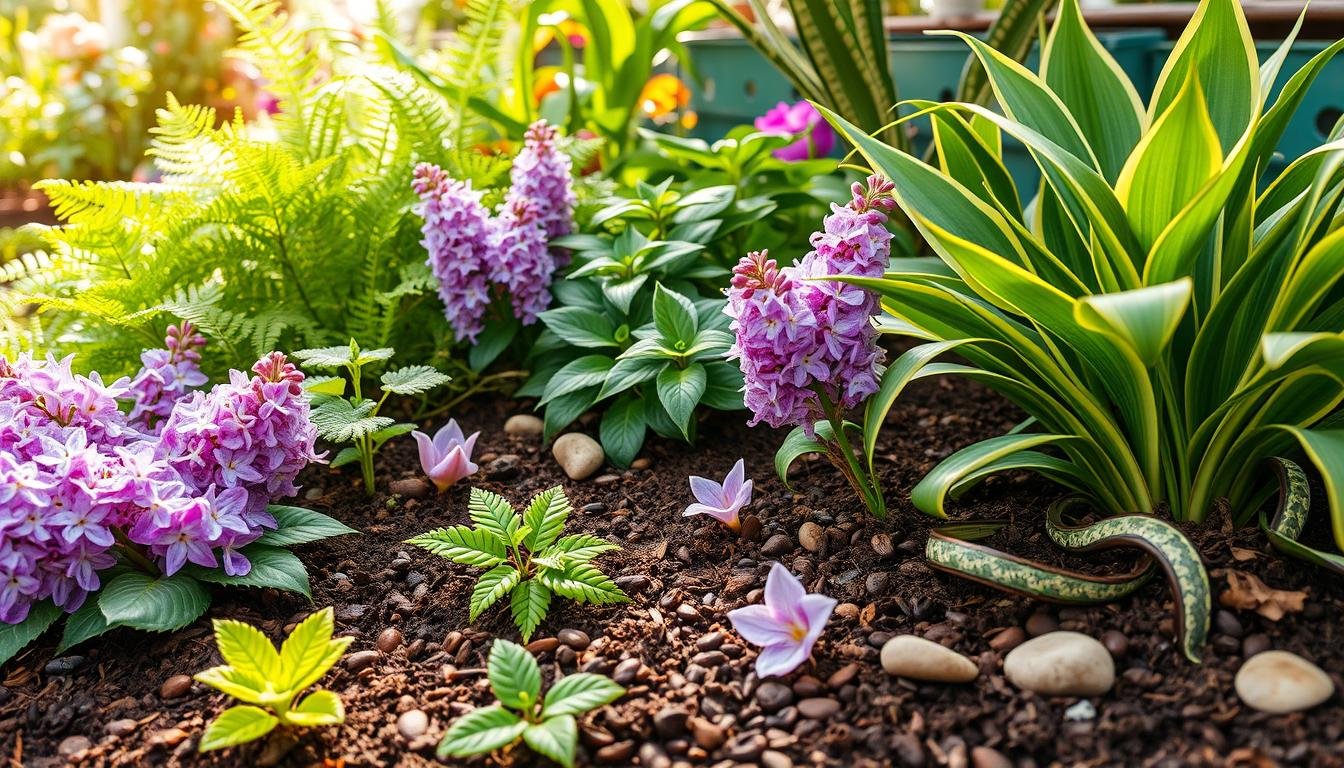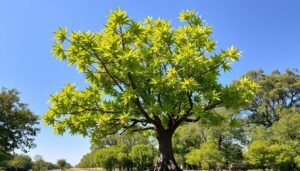Coffee grounds are often used in gardens to improve soil, but what plants don’t like coffee grounds? Not all plants respond well to the high acidity and nitrogen levels that coffee grounds provide. Knowing what plants don’t like coffee grounds is essential for maintaining a healthy garden.
In this article, we’ll explore how to use coffee grounds wisely, discuss which plants are sensitive to them, and provide tips to help all your plants thrive. This guide will ensure you make the best choices for your garden’s needs.
Key Takeaways
- Coffee grounds contain nutrients like nitrogen, potassium, and phosphorus valuable for some plants.
- Certain plants, such as tomatoes and some houseplants, may be adversely affected by coffee grounds.
- Excessive coffee ground usage can lead to nutrient imbalances and hinder plant growth.
- Composting coffee grounds can help neutralize acidity and promote healthier soil conditions.
- Understanding your plants’ preferences is essential to avoid growth issues associated with coffee grounds.
Table of Contents
Coffee Grounds in Gardening
Coffee grounds are a useful tool for gardeners. They have a lot of nitrogen, about 2.0%, which helps plants grow. The pH of used coffee grounds is usually between 6.5 and 6.8, good for many plants. But fresh coffee grounds are more acidic, around 5.0, and can harm plants that like neutral or alkaline soil.
Using coffee grounds in gardening can have different effects. Some plants, like blueberries and azaleas, do well in acidic soil. But others, like lavender, rosemary, and tomatoes, might not. It’s key to know how coffee grounds affect coffee grounds and plant health to avoid harming your plants.
Before adding coffee grounds, check your soil’s condition. Plants that don’t like nitrogen can get damaged. Coffee grounds also help fungi grow, which can be hard to control.
| Plant Type | pH Preference | Response to Coffee Grounds |
|---|---|---|
| Blueberries | Acidic | Beneficial |
| Tomatoes | Neutral | Negative (stunted growth) |
| Lavender | Alkaline | Negative (root rot) |
| Geraniums | Neutral | Negative (inhibited growth) |
| Succulents | Sandy | Negative (reduced drainage) |
By understanding these points, you can garden better and help your plants grow well.
What Plants Don’t Like Coffee Grounds
Many gardeners love using coffee grounds in their gardens. But, some plants don’t like them. It’s important to know which plants don’t do well with coffee grounds. This helps keep your garden healthy.
Some plants may not grow well because of coffee grounds’ acidity and nitrogen. We’ll talk about these plants and why they might not like coffee grounds.
Common Plants Affected by Coffee Grounds
Here are some plants that don’t like coffee grounds:
- Lavender
- Geraniums
- Clematis
- Lilacs
- Asparagus ferns
- Spinach
- Summer Squash
- Peas
- Beans
- Roses
These plants prefer neutral or alkaline soils. Using coffee grounds can harm them. Always test your soil pH before adding coffee grounds.
Reasons for Dislike
There are a few reasons why some plants don’t like coffee grounds:
- Increased Acidity: Coffee grounds are acidic, with a pH of 4 to 5. This acidity can hurt plants that like neutral or alkaline soils.
- High Nitrogen Levels: Too much nitrogen can harm young or sensitive plants. It can mess up their growth cycles.
To have a great garden, know which plants don’t like coffee grounds. Watch your soil and adjust your gardening to help your plants grow well.
How Coffee Grounds Affect Plant Growth
Coffee grounds are great for gardening. They can change the soil’s pH and affect nutrient levels. It’s important to watch these changes to help plants grow well.
Impact on Soil pH
Coffee grounds are usually neutral, with a pH of 6.5 to 6.8. But, they can make the soil more acidic over time. This might not be good for plants that like neutral or alkaline soil. It’s a good idea to test the soil’s pH regularly to make sure it’s right for your plants.
Nutrient Imbalance in Plants
Coffee grounds have a lot of nitrogen, which plants need to grow. But, using too much can upset the balance of nutrients. This might make plants grow more leaves but fewer flowers or fruits. For example, tomatoes and peppers might not produce as much.
To avoid this, use coffee grounds in moderation. Mix them with other compost materials so they make up no more than 20% of the mix. This helps keep the nutrients balanced and ensures plants grow well.
| Aspect | Details |
|---|---|
| Soil pH | Fresh coffee grounds typically have a pH of 6.5 to 6.8, may acidify soil over time. |
| Nitrogen Content | Coffee grounds are rich in nitrogen, crucial for plant growth. |
| Nutrient Recommendations | Limit coffee grounds to 20% in compost to avoid nutrient imbalances. |
| Effects on Crop Yields | Excessive nitrogen can lead to reduced flowering or fruiting in plants. |
| Composting Advice | Integrating coffee grounds effectively can enhance decomposition rates. |
pH Sensitivity of Specific Plants
Some plants like certain soil pH levels, especially when coffee grounds are added. Coffee grounds can make the soil too acidic for many plants. It’s important to know what plants like to keep them healthy.
Plants Preferring Alkaline Soil
Many plants do well in alkaline soil. Here are a few:
- Lilacs grow best in soil with a pH of 7.0.
- Geraniums don’t like acidic soil, like what coffee grounds make.
- Lavender struggles in acidic soil.
- Sagebrush can handle soil up to pH 8.5.
- Russian sage grows best in soil pH above 7.0.
For plants that don’t like coffee grounds, watch the soil’s pH closely. This helps them grow well.
Signs of pH Stress
Spotting pH stress in plants is key to avoiding damage. Look out for:
- Yellowing leaves: This can mean the plant is lacking nutrients or has too much acidity.
- Stunted growth: If leaves and roots don’t grow right, the soil pH might be off.
- Decreased flowering or fruit production: Soil that’s too acidic can stop plants from blooming or producing fruit.
Watch for these signs to see if coffee grounds are harming your plants. Testing the soil regularly helps. It’s crucial for the health of plants sensitive to coffee.
Caffeine Sensitivity in Plants

Caffeine in coffee grounds can be a problem for many plants. Some gardeners think coffee grounds are good for all plants. But, I’ve found that some plants really don’t like caffeine.
This dislike can cause health problems, especially in plants that are already delicate.
How Caffeine Affects Plant Health
Caffeine in the soil can harm plants. It can make them wilt, grow slowly, and turn flowers yellow. Plants that are sensitive to caffeine use too much energy on leaves.
This can hurt their ability to grow fruit and flowers. It makes them weaker and less healthy.
Varieties of Plants Sensitive to Caffeine
Some plants don’t like caffeine at all. Here are a few examples:
- Roses
- Lilacs
- Hydrangeas
- Tomatoes
- Peppers
- Eggplants
- Melons
These plants don’t do well with the extra acidity and nitrogen from coffee grounds. Tomatoes, for example, need a pH between 6.2 and 6.8 to grow well. Coffee grounds can make the soil too acidic, which is bad for tomatoes.
Consequences of Using Coffee Grounds
Using coffee grounds in gardening can harm plant health. It’s important to know how coffee grounds affect plants. Some plants may get sick, while others may not grow well.
Potential Toxicity for Sensitive Plants
Some plants are very sensitive to coffee grounds. The chemicals in coffee can be harmful. Fresh coffee grounds can hurt delicate plants and stop them from growing.
Compounding Nutrient Issues
Coffee grounds can mess up the nutrients in the soil. They have a lot of nitrogen, which can cause problems. This makes it hard for plants to get the nutrients they need.
So, it’s important to check the soil often. Knowing about coffee ground toxicity helps me take better care of my garden.
Plants Generally Harmed by Coffee Grounds
Knowing which plants don’t like coffee grounds is key for a healthy garden. Many gardeners don’t know how coffee grounds can harm certain plants. Knowing this can help avoid problems and make plants grow better.
Examples of Sensitive Plant Varieties
Some plants don’t do well with coffee grounds in their soil. Here are a few examples:
- Tomatoes
- Asparagus
- Geraniums
- Azaleas
- Lavender
- Rosemary
These plants don’t like the acidity from fresh coffee grounds. They prefer soil that’s more neutral or alkaline.
Growth Issues Observed
Yellow leaves and slow growth are signs of trouble. Plants that don’t like coffee grounds may have trouble getting the nutrients they need. This can cause:
- Poor flowering
- Reduced fruit sets
- General decline in plant vigor
Also, plants sensitive to nitrogen, like clovers, might get nitrogen burn. Knowing what plants need helps me garden better and keep my garden healthy.
Best Practices for Using Coffee Grounds in Gardening
Using coffee grounds in my garden has many benefits. But, I know it’s important to use them in the right amount. This way, I get the most out of them without harming my plants.
Balancing Coffee Ground Application
When adding coffee grounds, a little goes a long way. I spread them thinly so I can watch how my plants react. It’s important to keep coffee grounds to 20 percent of my compost mix. This helps keep the soil healthy.
I also aim for a 4-to-1 ratio of brown to green materials. This helps break down the grounds without making the soil too acidic. Adding them slowly helps prevent a barrier that can stop plants from growing.
Composting to Neutralize Acidity
Composting coffee grounds helps make them less acidic. Over time, they become neutral or even alkaline. This makes them good for more plants.
I make a “coffee ground tea” by soaking the grounds in water. This liquid fertilizer is great for acid-loving plants like blueberries and roses. Using it once a week helps feed my plants.
Beneficial Alternatives to Coffee Grounds
Looking for coffee ground alternatives, I see many gardeners benefit from organic amendments. These are especially good for plants that like alkaline soil. There are many options that improve soil health without coffee grounds’ downsides.
Organic Amendments for Alkaline Plants
For alkaline-loving plants, agricultural lime and gypsum are great. They add calcium, which helps plants grow well. Crushed eggshells also help with calcium, though they take time to break down.
Knowing plants need calcium helps fix common problems. This knowledge is key to healthy plants.
Other Soil Enhancers to Consider
There are many soil enhancers to choose from. Compost, peat, and organic mulch improve soil structure and nutrients. Each has its own benefits for soil quality:
| Soil Enhancer | Benefits | Considerations |
|---|---|---|
| Compost | Improves soil fertility and water retention. | Requires maintenance and time to decompose. |
| Peat | Enhances moisture retention and aeration. | Sourced from non-renewable bogs; consider alternatives. |
| Organic Mulch | Suppresses weeds and retains moisture. | Needs replenishing as it decomposes. |
Using these soil enhancers helps create a healthy garden. This way, I can grow plants well and enjoy a diverse garden. It makes gardening more rewarding.
Conclusion
Using coffee grounds in gardening is complex. It’s important to know which plants don’t like them. For example, plants like lilacs and geraniums need alkaline soil, not acidic.
Soil pH and nutrients are key for plant growth. Most plants do best in a pH of 6.0 to 7.0. Watching plant health helps avoid problems like soil compaction and nutrient imbalances.
Composting coffee grounds before using them can help. It makes the soil better for plants. Coffee grounds can also improve soil drainage and attract good worms.
With the right care, coffee grounds can be good for gardens. They help plants grow well. I can use them wisely to make my garden healthy and beautiful.




